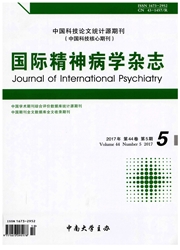

 中文摘要:
中文摘要:
目的:探索城市女性遭遇性侵犯的发生率及风险因素。方法:采用方便取样,在广东省3城市随遇选取1023名17—45岁女性,匿名填写人口学信息统计表、艾森克人格问卷(ZPQ)、特质应付方式问卷(TCSQ)、社会支持自评量表(SSRS)、应激史问卷(THQ)。结果:在有效回应的946人中,报告有被性侵犯经历的有223人,占23.57%。创伤事件数量、受教育程度、神经质、消极应对方式、婚姻状况与性侵事件正相关(r=0.07~0.51,均P〈0.05),而主观支持和支持利用度与性侵事件负相关(r=-0.12,-0.08,均P〈0.05)。Logistic多因素回归分析表明,较多的创伤事件数量(OR=1.85~2.80)、较多受教育年数(OR=1.11~1.54)、主观支持水平较低(OR=0.86~0.99)的女性有较高的被性侵犯风险,这3个因素可共同解释40.24%的城市女性被性侵风险。结论:较高的教育水平、较多经历创伤事件及较低的主观支持程度可能是城市女性遭遇性侵犯的风险因素。
 英文摘要:
英文摘要:
Objective: To study the prevalence and risk factors among urban females suffering sexual assault in China. Methods: Quantitative analysis method was used in this study. One thousand and twenty-three females, aged from 17 to 45 years old, from three cities ( i. e. Shenzhen, Huizhou, and Guangzhou) in Guangdong were recruited by accidental sampling. They were asked to complete standardized anonymously questionnaires, including the Demographic Information Form, the Eysenck Personality Questionnaire (EPQ), Trait Coping Style Questionnaire (TCSQ), Social Support Rating Scale (SSRS) and Trauma History Questionnaire (THQ). Results: Sexual assault exposure at least once was reported by 23.57 % of respondents (n = 223/946). Sexual assaults events were positively correlated with the frequency of trauma events, years of education, neuroticism, negative coping strategies and marital status (r = 0. 07 -0. 51, P 〈 0. 05), and were negatively correlated with the availabilities of subjective social supports and the utilization of the supports (r = -0. 12, -0. 08, P 〈 0. 05). Multivariate logistic regression analyses revealed significant associations between sexual assault by more trauma events ( OR = 1.85 - 2. 80), more years of education ( OR = 1.11 - 1.54), and lower subjective support ( OR = 0. 86 - 0. 99). All three psychosocial factors together explained 40. 24% of the risk factors among urban female suffering sexual assault. Conclusions: These findings suggest that more years of education, more trauma events and lower subjective support may be factors that increase risk of sexual assault among urban females.
 同期刊论文项目
同期刊论文项目
 同项目期刊论文
同项目期刊论文
 Abnormal cerebellum density in victims of rape with post-traumatic stress disorder: Voxel-based anal
Abnormal cerebellum density in victims of rape with post-traumatic stress disorder: Voxel-based anal Validity of the Chinese version Mood Disorder Questionnaire (MDQ) and the optimal cutoff screening b
Validity of the Chinese version Mood Disorder Questionnaire (MDQ) and the optimal cutoff screening b High-frequency rTMS treatment increases left prefrontal myo-inositol in young patients with treatmen
High-frequency rTMS treatment increases left prefrontal myo-inositol in young patients with treatmen Abnormal grey matter in victims of rape with PTSD in Mainland China: a voxel-based morphometry study
Abnormal grey matter in victims of rape with PTSD in Mainland China: a voxel-based morphometry study Validity of the 32-item Hypomania Checklist (HCL-32) in a clinical sample with mood disorders in Chi
Validity of the 32-item Hypomania Checklist (HCL-32) in a clinical sample with mood disorders in Chi Altered resting-state functional connectivity of thalamus in earthquake-induced posttraumatic stress
Altered resting-state functional connectivity of thalamus in earthquake-induced posttraumatic stress Dynamic Functional Connectomics Signatures for Characterization and Differentiation of PTSD Patients
Dynamic Functional Connectomics Signatures for Characterization and Differentiation of PTSD Patients Acute stress enhances contact dermatitis by promoting nuclear factor-kappa B DNA-binding activity an
Acute stress enhances contact dermatitis by promoting nuclear factor-kappa B DNA-binding activity an Increased regional homogeneity in internet addiction disorder: a resting state functional magnetic r
Increased regional homogeneity in internet addiction disorder: a resting state functional magnetic r Psychopathological, biological, and neuroimaging characterization of posttraumatic stress disorder i
Psychopathological, biological, and neuroimaging characterization of posttraumatic stress disorder i Influence and interaction of genetic polymorphisms in serotonin systems and life stress on antidepre
Influence and interaction of genetic polymorphisms in serotonin systems and life stress on antidepre High-frequency rTMS treatment increases white matter FA in the left middle frontal gyrus in young pa
High-frequency rTMS treatment increases white matter FA in the left middle frontal gyrus in young pa 期刊信息
期刊信息
